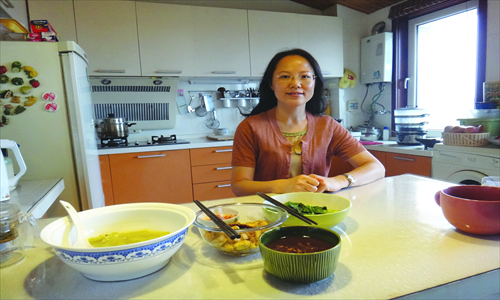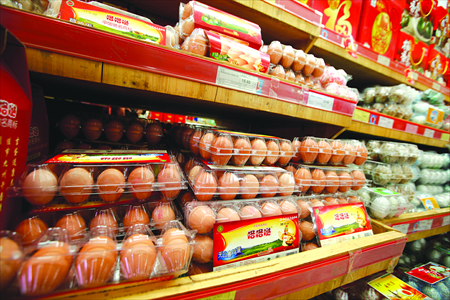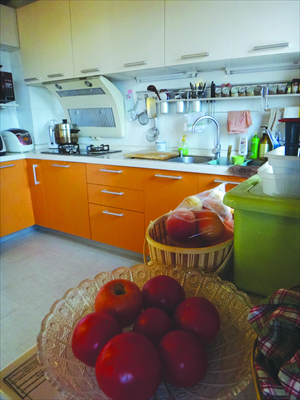Looking for danger in the wrong places

Fan Zhihong is frequently berated for her advice on eating healthy. Photo: Yin Yeping/GT
As famed nutritionist and author Fan Zhihong puts the dinner she just made on the table, she defensively notes, "Many people online say my dishes look terrible and don't even count as food." Although she just finished cooking, there is no oily smell in her kitchen.
Indeed, this nutritionist and food expert of China Agriculture University, famed for promoting safe and healthy eating, has prepared a dish without the fat and oil typical of much Chinese cooking - a small dish of stewed spinach, stir-fried tofu, white gourd soup and a bowl of mixed-grains soup.
Fan, like some other experts, believes that the public's current focus on food safety is misplaced and even unhealthy. She sees no point in worrying about the possible long-term risks of unsafe pesticide levels or the remote chance of severely contaminated food if people ignore the clear and present danger of an unhealthy diet.
Fan and some other professional nutritionists are spreading their messages via social media, becoming active members of food safety groups and answering questions about healthy eating. She has over 260,000 fans on the microblog Sina Weibo, and often makes television appearances.
Not content to simply enjoy her food at home, she often shares her recipes with others by posting them online, often to howls of criticism about the lack of oil and fatty meat so many people crave, even though studies show it is killing them.



A wide selection of food in supermarkets can be laden with hidden dangers. Photos: Li Hao/GT
Fear of food
A seemingly endless stream of disgusting and increasingly outlandish food scandals continue to shock the public and damage its trust. By watching television or reading newspapers, one could easily get the impression that many of the lamb kakabs for sale are actually rat, the eggs are faked in a back alley chemistry lab and the ginger is soaked in poison.
These media reports are based on single episodes and anecdotes. There is no doubt that very bad and very weird things happen to food in China, but on the other hand, the country is a big place.
Zhang Pingfeng, the deputy director of Beijing Administration for Industry and Commerce, told the People's Daily Online in June 2013 that every year there are over 200,000 samples of food being tested to verify the food safety rate in Beijing. "The safety rate is rather high, in 2012 the food that met safety standards reached 98.23 percent," he said.
These statistics suggest that 1 in 50 of the things you eat doesn't meet food safety standards. Some people do not find this reassuring.
Famously, during the two sessions in March 2013, Cui Yongyuan, the CCTV talk show host, said that he does not trust the food safety in China. When told that 99 percent of the milk powder in China is safe, he responded, "How do I know where that one percent is?"


A wide selection of food in supermarkets can be laden with hidden dangers. Photos: CFP
Risk analysis
Despite of all the doubt and suspicion, from Fan's perspective, people often care about food safety in the aspects that matter less to their health, while they overlook the parts should matter to them. "Things about food safety are spread through word of mouth, and people tend to trust whatever they heard about," she said. She tries to be more rational when assessing food health and safety risks.
She suggests that eating more whole grains, doing more exercise and cooking with less oil would be much more beneficial to people's health than focusing their energy on avoiding tainted food.
"Food safety has been so exaggerated that very often there is nothing to fear but fear itself," she said.
For example, at home, Fan does not wash rice before she puts it in the rice cooker, because that washes away much of the nutritional benefit.
In her kitchen, the fume ventilator over the stove is so rarely in use that she seldom needs to clean it. Although it is an open-concept kitchen that shares the same space as the living room, there is no cooking smell permeating her home. She seldom fries food, but instead stews it. When she does chose to fry, she has her own way of doing it. "When people fry food, they tend to wait until the oil in the pot gets smoky before starting," she said. "Yet this could produce cancerous elements that jeopardize your health." She uses a lower heat.
Many families peel the outer part of cabbages and other vegetables for fear it is soaked in pesticides, but Fan eats it. "The outer parts of vegetables such as cabbages are in deep color and therefore contain more nutrition."
Fan does not turn a blind eye to the risk of contaminated food, but instead tries to mitigate the risk by keeping a varied diet. "You just need to eat less for every kind of food to reduce its affect on your body," she said.
Fan said that her knowledge of nutrition and agriculture makes her less concerned about food safety. "Instead of being fussy about the length of time for washing rice or vegetables, my concern is on what the percentage of whole wheat will be in my meal, how many hours of physical exercise I do per week, and the importance of keeping a good mood," she said.
Dirty habits
Chen Zhikun, the standing director of the Beijing Nutritionists Club, shares Fan's ideas on food safety.
Chen has been holding thousands of lectures telling people his notion of good and safe food. He pays little attention to each individual food safety scandal since he claims that the overall situation is not as bad as people think.
Pesticide is one major element of food safety, yet he chooses to ignore it in his kitchen. "The things like pesticide will jeopardize your health but its severity depends on its quantity," he said. "Yet the quantity of pesticide is something you cannot tell unless you take it for experiments in a laboratory." Considering the relatively low overall occurrence of food safety issues, he thinks worrying about these things does not make much sense.
Many home cooks worried about pesticides will wash and dip fresh vegetables in water several times before eating them. But not Chen. "I will use boiled water to wash it once instead of dipping it in water," he said, noting that dipping food in water for too long will not reduce its pesticide level but rather its nutritional value.
This notion is reflected in the way he prepares food in his kitchen. Even when Chen is eating an apple, he acts differently from many ordinary Chinese. "I never peel an apple since some of the nutrition is only found in the skin," he said. Referring to the fact that some apples are waxed, he says, "These waxed apples are mostly imported and appear in the market mainly during the low season," he said. He avoids buying them at that time.
Retain confidence
Fan often uses her Weibo as an online classroom answering people's questions concerning food safety online.
"What kinds of food to choose is one's personal choice," Fan once said on Weibo. "One should eat less fried food or food made with a long and complicated manufacturing process."
Whenever she posts any recipe, there is almost a dispute over its appearance and quality. One time, she posted a meal with some sweet potato. People then started arguing that they might be genetically altered and not healthy. "The sweet potato has nothing to do with genetically modified food," Fan simply replied.
Fan has mostly become used to online criticism. But she says some of the comments that aim to directly insult her and her notion of healthy eating sting. Recently, when she posted a recipe, an online user named Shengsheng Yueer said, "Food like this cannot raise one's appetite and I would never eat it, even it is for free... Migrant workers might have it just to save money."

A glimpse of Fan's kitchen Photo: Yin Yeping/GT
Skeptical but smart
Fan said that people should be skeptical about food quality, but their doubt needs evidence to stand on. "When I pick food I prefer to focus on its nutritional elements more," she said. "Once you have absorbed enough nutrition, your resistance against pollutants will rise."
The common thread through food scandals is artificial additives. But many dishes can't be made without them. "You cannot expect to eat packaged goods while also hoping that there is no food safety concern involved in it," she said.
Taking her point one step further, she notes that sugary drinks like Coca-Cola cause illnesses like diabetes and osteoporosis. "Although there are no safety scandals on cola drinks, I won't drink them at all," she said. "But the product itself meets national food safety standards."